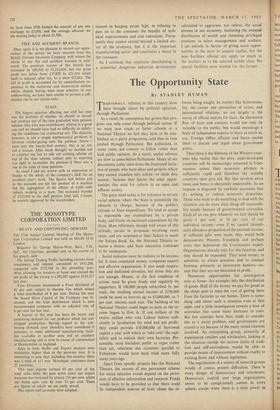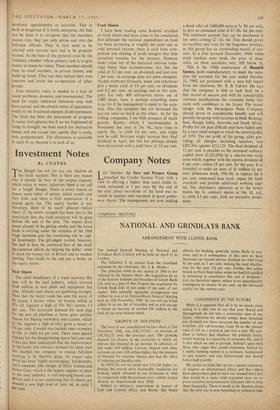The Opportunity State
By STANLEY HYMAN
TRADITIONALLY, reforms in this country have been brought about by political agitation, through Parliament.
As a result the assumption has grown that pro- gress can only come through political action. If we want new roads or better schools or a National Theatre we feel they have to be esta- blished on a party programme, and then in time pushed through Parliament. But politicians, in many cases, are content to follow rather than lead public opinion. As a result, useful reforms are slow to come before Parliament. Many of our discontents today stem from the frustrated initia- tive of people who have ideas and projects which they cannot translate into action—or think they cannot : because they ignore the other oppor- tunities that exist for reform in an open and affluent society.
The great need today is for initiative in certain social spheres where the State is potentially the obstacle to change, because of the public's attitude to State expenditure. We tend to accept as reasonable any expenditure by a private body, and frown on increased expenditure by the State. Most reformers, though well aware of this attitude, persist in proposals involving more taxes, and are surprised at their failure to reach the Statute Book. So, the National Theatre re- mains a dream, and State education continues to be inadequate.
Social initiative must be realistic to be success- ful. It must command money, competent experts and effective organisation. It also needs inspira- tion and dedicated devotion, but alone they are not enough. Money, as the first condition of action, must be given freely and regularly by supporters. If 100,000 people subscribed Is. per week, the resulting annual income of £250,000 could be used to borrow up to £5,000,000, at 5 per cent. interest, each year. The building of the National Theatre could begin as soon as the in- come began to flow in. If one million of the twelve million who vote Labour believe suffi- ciently in 'production for need and not profit,' they could provide £50,000,000 of borrowed capital a year with which to 'take over' the capi- talists and to initiate their own factories. Pre- sumably, most Socialists prefer to argue rather than act, otherwise this economic parallel to Fabianism would have been tried more fully many years ago.
Apart from specific projects like the National Theatre, the success of any permanent scheme
for social initiative would depend on the provi- sion of effective information and research. Funds would have to be provided so that there could be independent sources, of facts about the re-
forms being sought. In matters like homosexua- lity, the causes and prevention of crime, and international relations, we are largely at the mercy of official sources for facts. An alternative flow of facts and analysis would not only be valuable to the public, but would encourage a body of independent experts to learn as much as, say, Foreign Office officials and hence enable them to discuss and argue about government policy.
Then there is the dilemma of the Western coun- tries who realise that the poor, underdeveloped countries will be increasingly attracted to Com- munism unless their economic advance is sufficiently rapid and therefore the wealthy countries must give aid. But that involves extra taxes and hence is electorally undesirable. So an impasse is disguised by symbolic payments that do nothing to redress economic disparities. Those who want to do something to deal with the situation can do more than shrug off responsibi- lity simply because of governmental cowardice. Each of us can give whatever we feel should be given-1 per cent. or 10 per cent. of our individual income—even if we cannot immedi- ately allocate a proportion of the national income. If sufficient gifts were made, they would both demonstrate Western friendship and perhaps avert that depression the Communists expect. Organisations already exist for this function, and they should be expanded. They' need money to advertise, to obtain premises and to conduct business, primarily as investment bankers—ex- cept that they are not interested in profit.
Numerous opportunities for investigation exist at home—for example, into the distribution of goods. Half of the money we pay for goods in the shops goes to meet the cost of getting them from the factories to our homes. There is some- thing odd about such a situation even at first sight, and a little investigation reveals a host of anomalies that cause many increases in costs. But few attempts have been made to consider this as a social problem, and governments are scared to act because of the many vested interests involved. An enterprising group, primarily of experienced retailers and wholesalers, looking at the situation outside the narrow limits of tradi- tion and self-centredness, would be able to provide means of improvement without cruelty to existing firms and without legislation.
The organisation of a variety of research groups would, of course, present difficulties. There is every danger of bureaucracy and remoteness. Democratic control over large organisations seems to be conspicuously useless in every sphere, except when there is a clear power to terminate appointments or activities. This in itself is dangerous if it limits enterprise. All that can be done is to recognise that the members cannot rule, they can only advise and veto the full-time officials. They in turn need to be selected with extreme care and to be properly trained. At the base of the pyramid must be the 'ordinary member' whose primary task is to give money to causes he values. These members should meet in small numbers, in private homes, and build up funds. They can then initiate their own ventures and invite the co-operation of other groups.
True initiative today is needed in a host of social problems, domestic and international. The need for major industrial initiatives may well have passed, and the absurd antics of speculators testify to the frustrated energies of entrepreneurs. The State has been the instrument of progress in many vital spheres; but if we are frightened of using its strength, we must search for alternative means and not escape into apathy that is really only postponement. The alternative is available to each of us, because it is each of us.







































 Previous page
Previous page